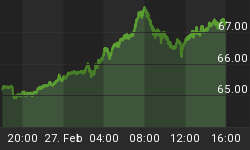Investors love a good turnaround story, as long-term Apple, Ford and General Motors investors will probably tell you.
After all, a company that manages to pick itself up by its bootstraps after coming close to the brink gives even erstwhile lukewarm cheerleaders an opportunity to smugly tell their friends “I-told-you-so.”
Few companies in the tech circle though need one as badly as IBM. Twenty-two--that's the number of consecutive quarters that Big Blue saw its revenue decline before managing to snap the unfortunate streak in December. But even that was barely an improvement, with the company's top line expanding an anemic 1 percent in constant currency.
Profits are still lagging—even though the pros have been modeling a gradual recovery for both sales and income.
But now it’s getting in front of the massive potential of blockchain technology, and most recently it’s onto to a possible solution to the many billions of dollars in aid that blockchain could keep from ending up in the wrong hands.
Emerging Technologies as the Lynchpin
IBM's ongoing turnaround has not been as easy as simply waiting out a bad leg of a product cycle to come to an end. That's a luxury the company can ill-afford, with its once-iconic mainframes losing out big time to far more flexible cloud-based platforms. Instead, IBM has had to invest heavily in emerging technologies including AI, IoT and, lately, blockchain. Related: The New War Unfolding In The Tech Space
IBM's foray into blockchain has been particularly impressive, with the company managing to emerge as the early leader in the still-embryonic industry.
In Juniper's Blockchain Enterprise survey, 43 percent of enterprises ranked IBM first, more than twice 20 percent for second-placed Microsoft. The company's blockchain projects are as interesting as they are varied, ranging from pilots in finance and healthcare to supply chain, logistics and even green environment and humanitarian causes.
A couple of days ago, IBM and Global Citizen, an anti-poverty campaign movement, threw down the gauntlet at developers, challenging them to use blockchain tech to develop apps that would revolutionize how donations are made to humanitarian causes.
The pair have joined hands in the U.N.-inspired Challenge Accepted initiative that aims to improve the lives of the world's most impoverished people. Developers of the initiative will access IBM's Blockchain Platform Starter Plan, which they can use to build a network that covers all aspects of a typical donation process.
Such a drive probably makes plenty of sense.
Governments and NGOs in developed economies give hundreds of billions of dollars every year in foreign aid and donations to less developed countries. The aid bucket in many of these countries tends to be quite leaky thanks to corrupt governments and state officials, meaning a good chunk of it usually ends up in the wrong pockets (though probably nothing like Senator Rand Paul's 2017 assertion that “70% is stolen off the top.”) Related: HSBC Hits Milestone With Its First Blockchain Trade
Any stolen dollar than ends up in the bank account of a corrupt kleptocrat is a dollar that could have gone to feed a hungry mouth or provide some of life's most basic necessities including clean water, shelter, medicine and education. Blockchain's immutable ledgers have the ability to provide better accountability along the disbursement chain.
More Than Money
But money is just one of the commodities that blockchain tech can track--it can also be used to improve transparency in the flow of goods and other supplies right from the donor to the recipient.
Luckily, developers ready to take up IBM and Global Citizen already have a precedent-- the World Food Programme (WFP) tapped into the ethereum blockchain to authenticate food disbursements in Pakistan.
There's also an added incentive, too-- developers can earn points which they can use to request access to IBM's experts.
By Alex Kimani for Safehaven.com
More Top Reads From Safehaven.com:
















